13-24 March 2017
I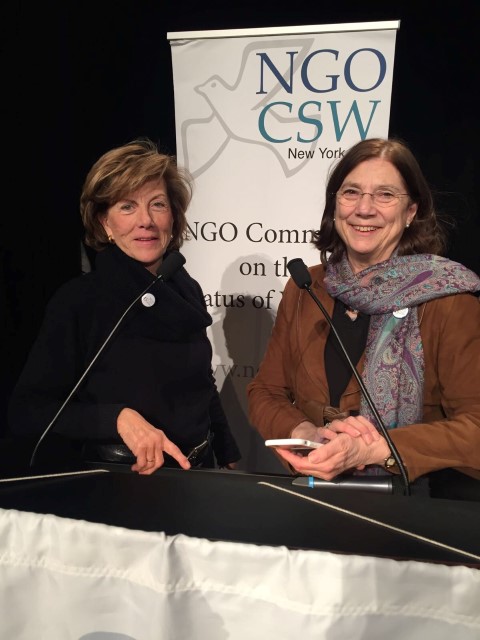 NLW was represented at the CSW by Khadija El Morabit (Vice Presidentfor MENA region), Lysbeth van Valkenburg (Treasurer) Margaret de Vos van Steenwijk (President), and Leticia Gutíerrez (Member of the Board), also Petra Rona member of INLW. Joaquima Alemany (Past President) also participated representing Dones et Libertat of which she is the President.
NLW was represented at the CSW by Khadija El Morabit (Vice Presidentfor MENA region), Lysbeth van Valkenburg (Treasurer) Margaret de Vos van Steenwijk (President), and Leticia Gutíerrez (Member of the Board), also Petra Rona member of INLW. Joaquima Alemany (Past President) also participated representing Dones et Libertat of which she is the President.
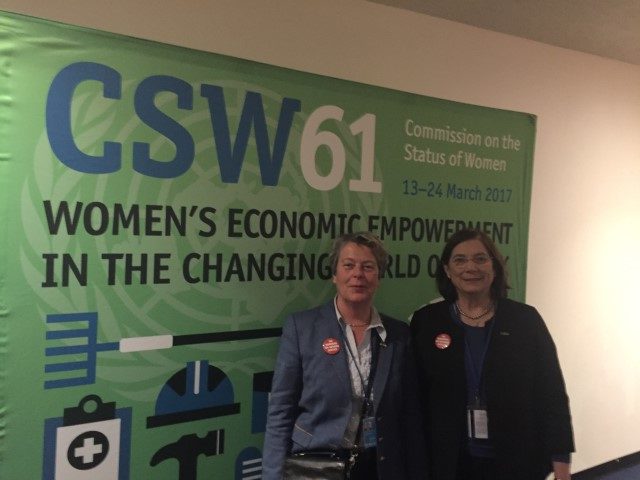
“Women’s Economic empowerment in the Changing World of Work” was this year’s priority theme. If we are to achieve gender equality by 2030, we must realize that this is everyone’s responsibility to ensure that it happens. The priority theme highlights, the vulnerability of women and girls as the most likely to be left behind economically and in status in the workplace. Women and girls must be ensured of equal access to technology; to land ownership; to finance/microfinance; the opportunity for higher and continuing education and they must be prepared and supported to hold positions of leadership in both public and private sectors and to have their rightful seat at the table during organizational, labor and peace negotiations.
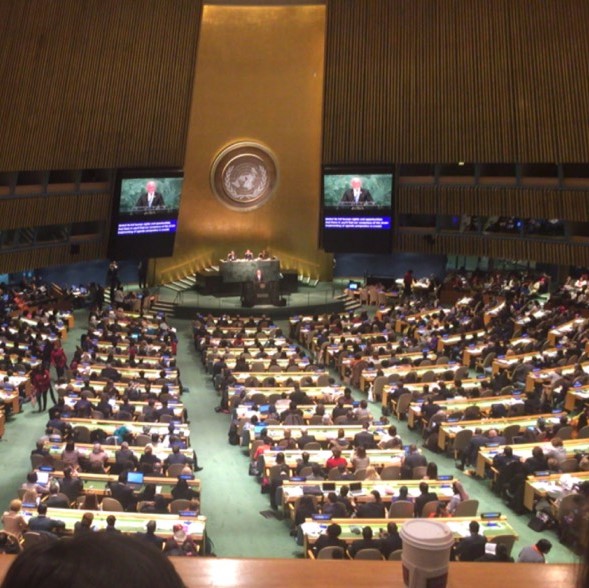 On Monday morning in the General Assembly we were welcomed by the new Secretary General of the UN, Antonio Guterres. He showed his heart lies with achieving the empowerment of women! “Male chauvinism blocks women. That hurts everyone. The empowerment of women is our key priority!”
On Monday morning in the General Assembly we were welcomed by the new Secretary General of the UN, Antonio Guterres. He showed his heart lies with achieving the empowerment of women! “Male chauvinism blocks women. That hurts everyone. The empowerment of women is our key priority!”
The Executive Director of UN Women Phumzile Mlambo-Ngcuka spoke of the “Constructive impatience for change”. “This CSW could be the much-needed accelerator for the implementation 2 and achievement of the 2030 agenda. We must make, and can make, the world of work, work better for women, transforming economies and realizing 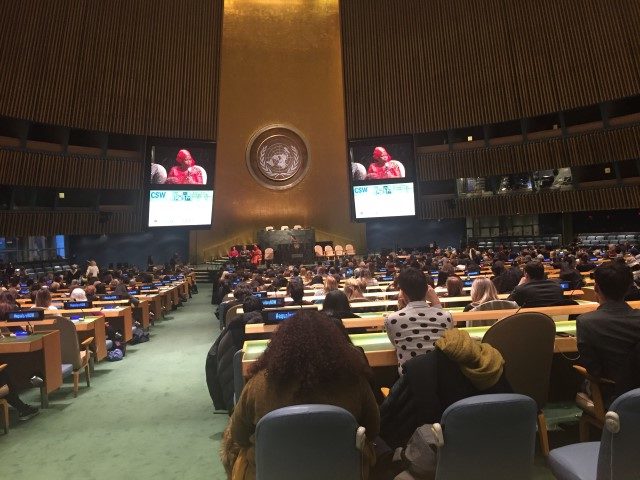 rights. We only have thirteen years until 2030. Every week and every month counts.”
rights. We only have thirteen years until 2030. Every week and every month counts.”
During the first week, a 3-minute action was held at the UN symbolic of the time that women and men’s pay is no longer equal. At the UN and at local/national levels we must create new arenas of decent work for women and girls, where there are no pay gaps, where labor laws are rightsbased and informal, unpaid care and domestic work is fully recognized.
 Because of the winter storm the congress was closed throughout the Tuesday.
Because of the winter storm the congress was closed throughout the Tuesday.
INLW board members who were present in New York used this time to hold a meeting to discuss the congress and to prepare INLW 20th anniversary this year in Andorra.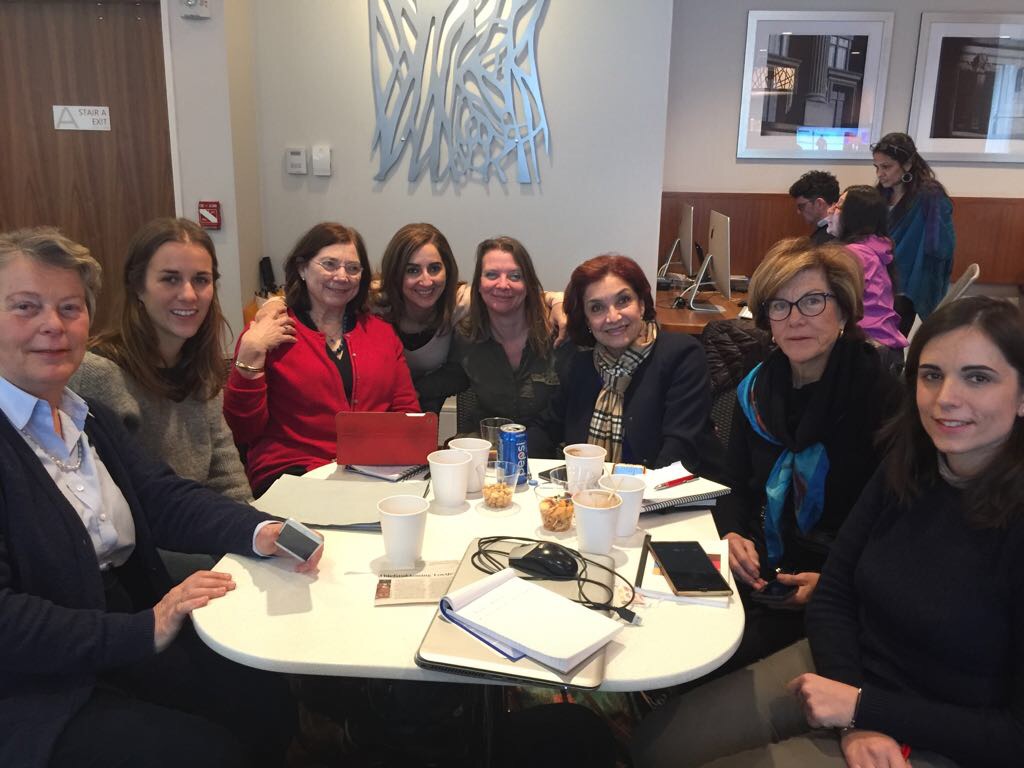
The first day one of the events where we were present was: 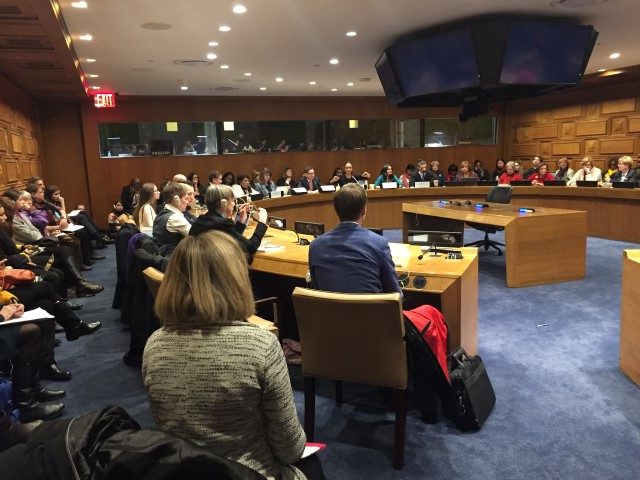 “Gender equality the Nordic way: What can we learn from it”.
“Gender equality the Nordic way: What can we learn from it”.
We have already heard about this method which is called the “Barber Shop”. It is all about the importance of mobilizing men and boys for gender equality. The Barber Shop, a place where many men meet can bring a conversation about how 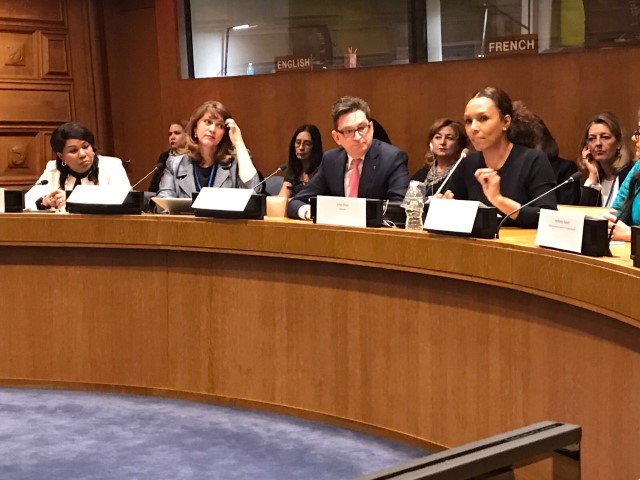 to treat women and how to communicate with women amongst men where they can talk among themselves in safe surroundings. This is led by 1 or 2 men who are bringing in the dialogue and reflection on how to make a better understanding between men and women and in the end more solidarity on issues such as equal pay. Investing in a good relationship between the sexes builds a better company in the end. In Switzerland, there is already a complete legal framework to see to equal pay and development. This is also shown in yearly surveys how companies are faring: “Naming and shaming”. It has been proved that by having more women in the top a business gets 37% more results.
to treat women and how to communicate with women amongst men where they can talk among themselves in safe surroundings. This is led by 1 or 2 men who are bringing in the dialogue and reflection on how to make a better understanding between men and women and in the end more solidarity on issues such as equal pay. Investing in a good relationship between the sexes builds a better company in the end. In Switzerland, there is already a complete legal framework to see to equal pay and development. This is also shown in yearly surveys how companies are faring: “Naming and shaming”. It has been proved that by having more women in the top a business gets 37% more results.
In Iceland, the government will get a law through parliament this year to get equal pay in 2020!
Every morning at 8.30 we were present at the NGO morning briefings.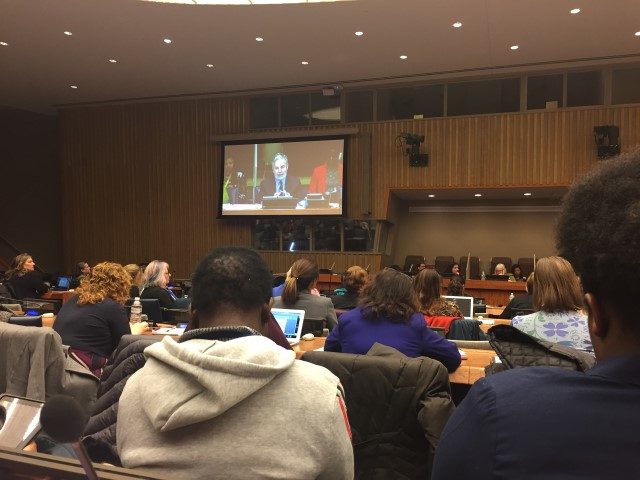
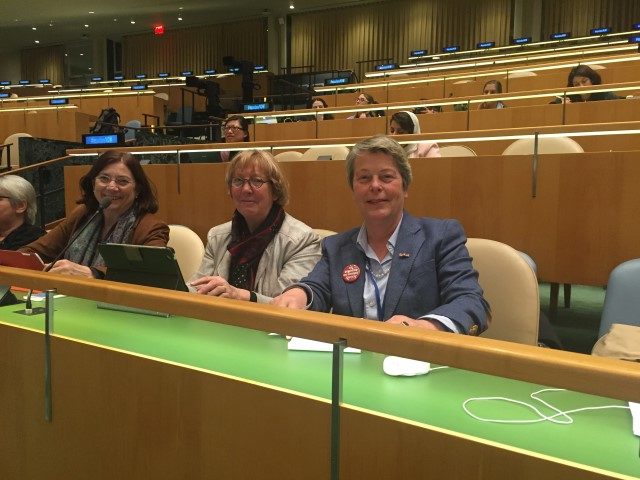
This year fortunately at the end all participating countries signed the “Agreed Conclusions”.
Press release from CSW
Feminist persistence pays off at UN Commission Status of Women, but challenges loom large in the changing world of work
Feminist activists have seen their hard work pay off as the UN 61st Commission on the Status of Women adopted a set of Agreed Conclusions that made significant commitments to advance women’s rights and economic empowerment in the changing world of work.
In response to feminists’ demands for gender-just strategies to confront the multiple impacts of climate change and related ecological damage, the Commission recognized the imperative of moving towards a just transition of the workforce toward low-carbon economies that deliver for women and the planet. “Now is the time for the strongest possible action toward a climate just planet, and this  requires actions like a global moratorium on coal and keeping global warming below 1.5 degrees Celsius, said Noelene Nabulivou of Diverse Voices and Action for Equality, Fiji. “This must be carried forward through a gender just and equitable and safe transition toward a low-carbon economy.”
requires actions like a global moratorium on coal and keeping global warming below 1.5 degrees Celsius, said Noelene Nabulivou of Diverse Voices and Action for Equality, Fiji. “This must be carried forward through a gender just and equitable and safe transition toward a low-carbon economy.”
The Commission also called for gender-responsive strategies to increase women’s resilience to the economic impacts of climate change. Recognizing that women continue to shoulder the bulk of unpaid care and domestic work, the Commission established a blueprint for governments to reduce and redistribute this work through public services, labour and social protections, and affordable child and other care services. The Commission also urged governments to measure the value of unpaid care and domestic work through time use surveys, which will help measure progress towards the UN Sustainable Development Goals.
For the first time, the Commission recognized the importance of the Declaration on the Rights of Indigenous Peoples, as it examined the focus area of indigenous women’s empowerment. The Commission also called upon governments to respect and protect indigenous women’s traditional and ancestral knowledge, and address the multiple and intersecting forms of discrimination and violence that they face. “That the Commission on the Status of Women also called for support for Indigenous women’s financial independence and economic self-determination, for example by establishing Indigenous-owned businesses, is a hard-won but important step for Indigenous sisters around the world,” said Sarah Burr, of the YWCA Australia.
In other wins, the Commission urged governments to end violence and harassment against women in the world of work, with a specific focus on strengthening and enforcing laws and policies and developing measures to promote the re-entry of victims and survivors of violence into the labour market. It also recognized that sexual and reproductive health and rights is essential for women’s economic rights, independence and empowerment. “These were hard-fought gains as countries like the United States, Russia and Guyana worked to weaken governments’ resolve to tackle violence and harassment and protect sexual and reproductive rights,” said Shannon Kowalski of the International Women’s Health Coalition. “Governments must face the facts that women’s rights to exercise autonomy over their bodies and lives is critical to their economic empowerment.” Language on families was also constructive in that it implied the reality of a diverse range of family structures. 5 The Women’s Rights Caucus is a coalition of more than 250 feminist and women’s rights organizations from across the globe.
For more information about CSW61 go to www.UNWomen.org. There you can also find in the official documents our INLW written statement: E/CN.6/2017/NGO/86. And on our website in the chapter CSW, www.inlw.org . The agreed Conclusions when definite will also appear on both websites.
Lysbeth van Valkenburg-Lely
Margaret de Vos van Steenwijk-Groeneveld

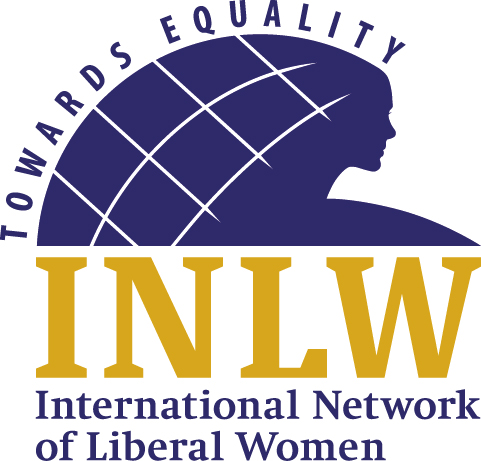
 Visit our Facebook page
Visit our Facebook page